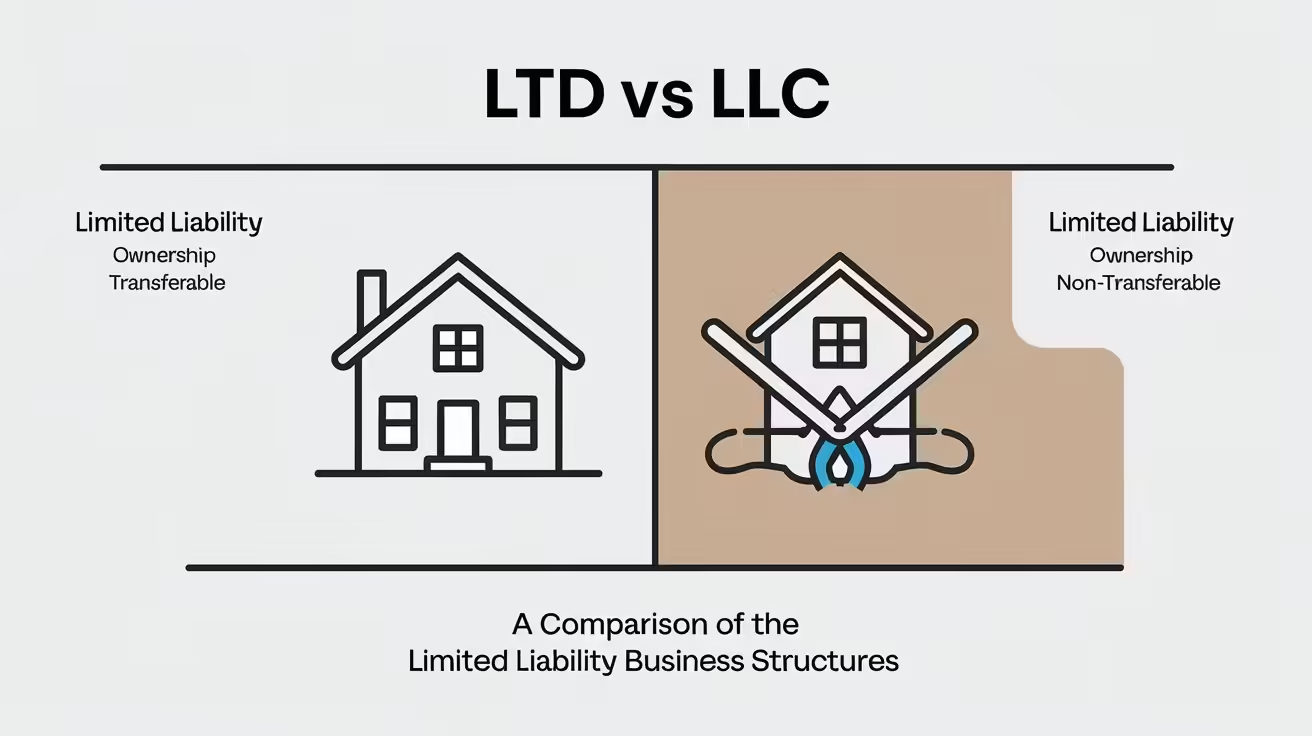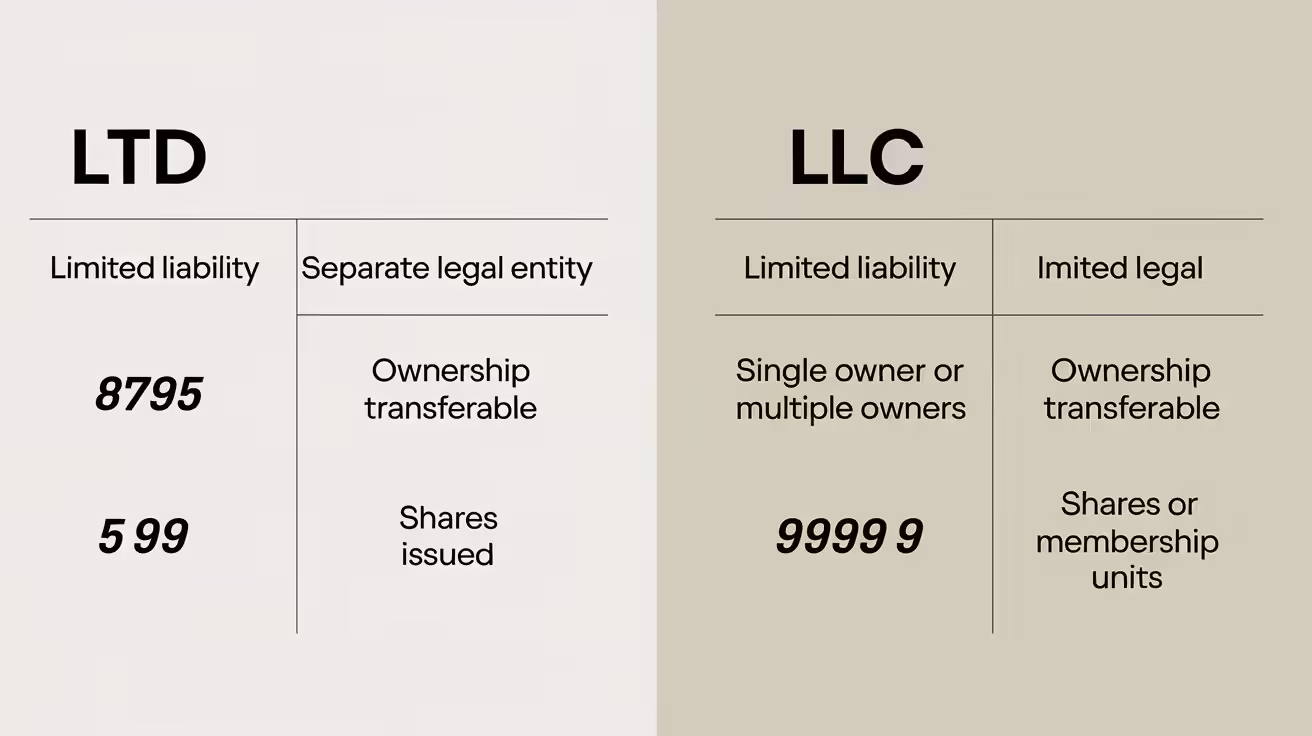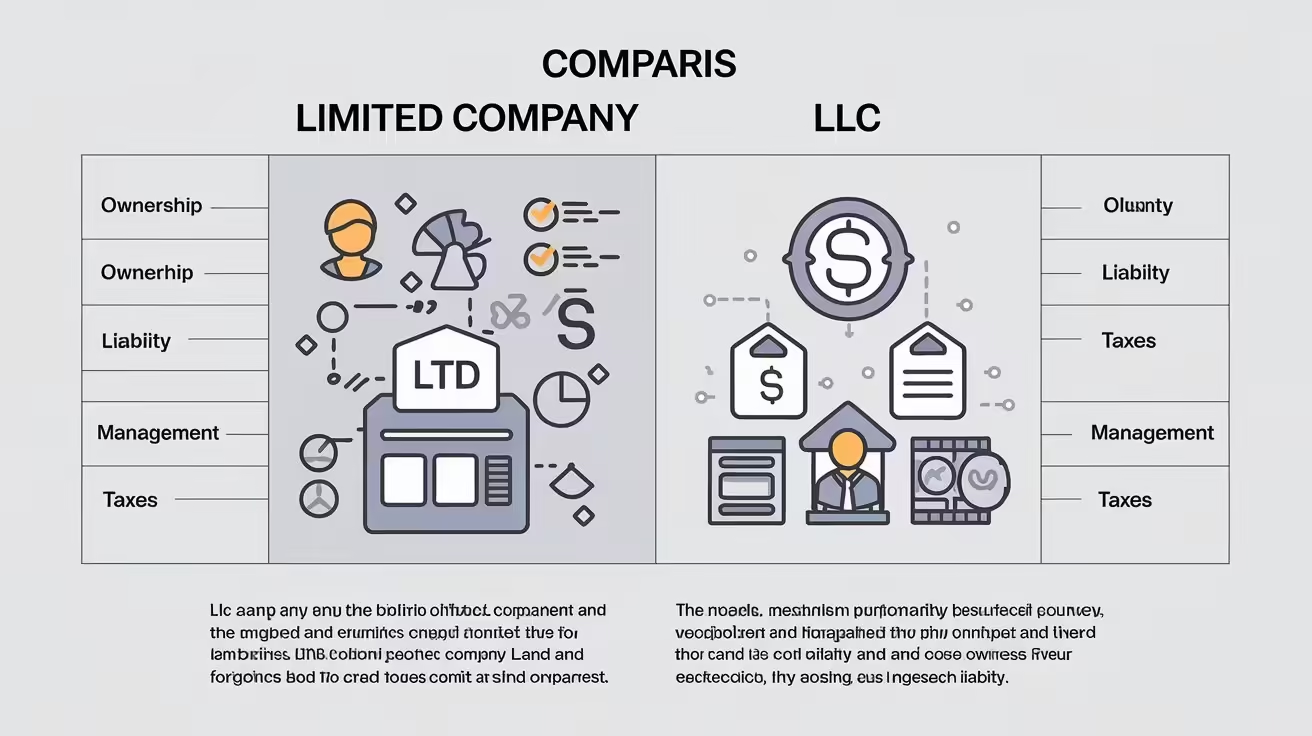Ltd vs LLC: A Comprehensive Comparison for Entrepreneurs

Choosing the right business structure is one of the most critical decisions entrepreneurs face when starting a company. The type of legal entity you select determines how your business operates, the level of liability protection you receive, and how taxes are paid. Two popular options are Limited Liability Companies (LLC) and Limited Companies (Ltd). While they may seem similar at first glance, the differences between Ltd vs LLC are significant, and understanding these distinctions is essential for making an informed decision that aligns with your business goals.
What is an Ltd?
A Limited Company (Ltd) is a type of legal entity commonly used in countries like the United Kingdom, Ireland, and certain Commonwealth countries. The term “Ltd” refers to a company that has limited liability, which means that the shareholders’ or members’ personal assets are protected if the company runs into financial difficulties. In other words, the liability of the shareholders is limited to the amount they initially invested in the business.
Ltd companies are further classified into two types: private limited companies (Ltd) and public limited companies (PLC). The key difference lies in how shares are offered. A private Ltd does not publicly trade its shares, while a public Ltd (PLC) can offer shares to the general public via a stock exchange.
Characteristics of an Ltd:
- Separate legal identity from its shareholders
- Limited liability for shareholders
- Must have at least one director
- Shares cannot be sold without the approval of other shareholders (for private Ltd)
- Subject to corporate tax and must file annual reports
What is an LLC?
A Limited Liability Company (LLC) is a flexible business structure commonly used in the United States. An LLC provides its owners—called “members”—with limited liability, similar to a corporation, but it also offers the tax efficiencies and operational flexibility of a partnership. In an LLC, the members are not personally responsible for the company’s debts or liabilities, meaning their personal assets are protected.
LLCs are a popular choice for small businesses and startups because of their simplicity and the legal protection they offer. Unlike an Ltd, an LLC does not issue shares, and there are fewer formal requirements for formation and maintenance.
Characteristics of an LLC:
- Separate legal entity from its owners
- Limited liability protection for members
- Flexibility in management structure
- No requirement to hold formal meetings or issue shares
- Pass-through taxation, where income is taxed on members’ personal tax returns
Ltd vs LLC: Legal Structure and Formation
The formation process for both Ltd vs LLC is relatively straightforward but varies by jurisdiction. In the UK, for example, forming an Ltd involves registering with Companies House and filing articles of association, along with other legal documents. In contrast, forming an LLC in the US requires filing articles of organization with the state where the business operates, accompanied by an operating agreement, which outlines the management structure and ownership details.
Both structures require compliance with specific regulatory obligations. For an Ltd, directors must comply with corporate governance requirements, file annual returns, and maintain accurate financial records. LLCs, while simpler, also need to keep their records in order and file annual reports, though the requirements are typically less burdensome than those for an Ltd.
Differences in Formation:
- Ltd: Involves more legal formalities, such as registering articles of association and appointing directors.
- LLC: Requires filing articles of organization with the state, typically simpler and more flexible.
- Ltd vs LLC: Ltd requires adherence to corporate governance structures, whereas LLCs offer more operational flexibility.
Ownership and Management
Ownership and management structures are where the Ltd vs LLC differences become more apparent. In an Ltd, ownership is represented by shareholders, and the company is governed by a board of directors. The directors manage the company on behalf of the shareholders, making key decisions about its operations. Shareholders typically have limited involvement in day-to-day management unless they are also directors.
In contrast, an LLC can be managed by its members or by managers who are appointed by the members. This flexibility allows LLCs to operate more like a partnership or a sole proprietorship, with the added benefit of limited liability. Members can actively manage the company or choose to take a passive role, depending on how the operating agreement is structured.
Key Points on Ownership and Management:
- Ltd: Shareholders own the company, directors manage it.
- LLC: Members can manage the business directly or appoint managers.
- Ltd vs LLC: LLCs offer more flexibility in management structures, while Ltds have a more formal separation between ownership and management.

Liability Protection
Both Ltd vs LLC offer limited liability protection, meaning the personal assets of the owners or shareholders are generally safe from the company’s debts or lawsuits. This is one of the main reasons businesses opt for these structures over sole proprietorships or general partnerships.
In an Ltd, the liability of shareholders is limited to their shareholdings. For example, if a shareholder has invested $10,000 in the company, their maximum loss is limited to that amount. Similarly, in an LLC, members are not personally liable for the company’s debts or legal obligations. The key difference here is that LLCs are more likely to face fewer restrictions and legal formalities compared to Ltds when it comes to liability protection.
Liability Protection Comparison:
- Ltd: Shareholders’ liability is limited to the amount they invested in shares.
- LLC: Members’ personal assets are protected, even if they actively manage the business.
- Ltd vs LLC: Both offer strong liability protection, but LLCs may provide more flexibility in this area due to fewer corporate governance requirements.
Taxation: Ltd vs LLC
One of the most significant differences between Ltd vs LLC is how each entity is taxed. Ltd companies are subject to corporate tax, meaning that profits are taxed at the corporate level. If the company distributes dividends to shareholders, those dividends are also taxed on a personal level, leading to potential double taxation.
LLCs, on the other hand, are typically taxed as pass-through entities. This means that the company’s profits or losses are passed through to the members, who report them on their personal tax returns. This avoids double taxation, making LLCs a popular choice for small businesses and startups. However, LLCs can also choose to be taxed as a corporation if they wish, giving them more flexibility in terms of tax planning.
Taxation Comparison:
- Ltd: Profits are subject to corporate tax, and dividends may be taxed twice (corporate and personal levels).
- LLC: Pass-through taxation avoids double taxation; profits are reported on members’ personal tax returns.
- Ltd vs LLC: LLCs offer more tax flexibility, while Ltds may face double taxation depending on how profits are distributed.

Ongoing Compliance and Reporting
Both Ltd vs LLC structures require some level of ongoing compliance, but the degree of formality differs significantly. Ltd companies are subject to more stringent regulatory requirements. For example, they must hold annual general meetings (AGMs), file annual financial statements, and comply with corporate governance rules. The directors of an Ltd also have fiduciary duties to the company, meaning they must act in the best interests of the company and its shareholders.
In contrast, LLCs generally have fewer ongoing compliance obligations. While they may need to file annual reports and pay state fees, they are not usually required to hold formal meetings or adhere to strict governance procedures. This makes LLCs particularly attractive for small businesses that want to avoid the bureaucratic burden associated with running a corporation.
Compliance and Reporting:
- Ltd: Must comply with corporate governance rules, file annual returns, and hold AGMs.
- LLC: Fewer formal requirements, no need for AGMs, but annual reports and fees are still necessary.
- Ltd vs LLC: LLCs are less burdensome in terms of compliance, while Ltds have more rigorous reporting obligations.
Funding and Investment Opportunities
When it comes to raising capital, Ltd companies have an advantage over LLCs. An Ltd can issue shares to investors, making it easier to attract funding from venture capitalists, private equity firms, or through public offerings (for PLCs). Investors are often more comfortable investing in Ltds because of the formal corporate structure and the ability to acquire equity in the form of shares.
LLCs, on the other hand, cannot issue shares. While LLCs can still raise capital by bringing in new members or securing loans, they do not have the same flexibility as Ltds when it comes to equity financing. This limitation can make it harder for LLCs to attract large-scale investment, especially from institutional investors.
Funding and Investment:
- Ltd: Can issue shares, making it easier to attract investors.
- LLC: Cannot issue shares, limiting its ability to raise capital through equity.
- Ltd vs LLC: Ltds have more flexibility in raising capital, while LLCs may rely more on loans or member contributions.
Which is Better: Ltd vs LLC?
Ultimately, the decision between Ltd vs LLC comes down to your specific business needs, goals, and location. Ltds are ideal for businesses that plan to raise capital through equity investment or those that want to operate in countries where the Ltd structure is standard, such as the UK. On the other hand, LLCs are perfect for small businesses and startups in the US that want a flexible structure with pass-through taxation and fewer compliance requirements.
When considering Ltd vs LLC, it’s crucial to weigh factors such as taxation, liability protection, management flexibility, and ongoing compliance. Both structures offer distinct advantages, and the best choice depends on your business model, the scale of operations, and your future growth plans.
Understanding the Global Context of Ltd vs LLC
When exploring the Ltd vs LLC debate, it’s essential to recognize that these two structures are rooted in different legal and cultural frameworks. A Limited Company (Ltd) is most commonly used in the United Kingdom and other Commonwealth nations, while Limited Liability Companies (LLCs) are prevalent in the United States. However, both structures have similar goals—limiting the liability of business owners and providing a formalized framework for business operations.
The popularity of the Ltd structure in the UK stems from its longstanding use as a flexible yet robust option for businesses of all sizes. In the US, LLCs emerged as a response to the rigid corporate requirements of traditional C-Corporations (C-Corps) and S-Corporations (S-Corps), offering a more flexible and tax-efficient model. Over time, the LLC has become the go-to option for small to medium-sized businesses in the US.
While both Ltd vs LLC serve the same basic purpose of protecting owners from personal liability, the differences in legal systems, taxation, and corporate governance mean that the two structures operate quite differently depending on where they are established.
Jurisdictional Considerations: Where You Do Business Matters
Another critical factor to consider in the Ltd vs LLC discussion is where your business operates. The laws governing the formation, taxation, and regulation of Ltd and LLC entities can vary significantly from one country to another, even within the same legal structure. For instance, while an Ltd in the UK might have relatively straightforward regulatory requirements, an LLC operating in the US could face vastly different state-level laws depending on where it is registered.
In the US, each state has its own set of rules and regulations concerning LLCs. Some states, like Delaware and Nevada, are particularly attractive for LLC formation due to their business-friendly environments, offering lower taxes and fewer regulatory hurdles. By contrast, an Ltd in the UK must adhere to national standards set by Companies House, but the overall regulatory framework is consistent across the country.
Therefore, understanding the local legal context is crucial when choosing between Ltd vs LLC. If your business plans to operate internationally or expand beyond national borders, you’ll also need to consider how your chosen structure will be treated by foreign jurisdictions. Some countries might recognize LLCs more easily, while others might prefer or better understand Ltd companies, especially if you’re dealing with European partners.
Operational Flexibility: Which Structure Suits Your Business Needs?
A key distinction between Ltd vs LLC is the level of operational flexibility each structure offers. For example, an LLC is known for its flexibility in management and ownership structure. As mentioned earlier, LLC members can choose to manage the business themselves (member-managed) or appoint managers to run the business on their behalf (manager-managed). This makes the LLC structure particularly appealing for entrepreneurs who want more control over day-to-day operations without the formalities of a corporate board of directors.
In contrast, Ltd companies operate within a more formalized framework, with a distinct separation between shareholders and directors. Shareholders, who own the company, typically play a passive role, leaving the company’s management to the directors. This separation can provide clear lines of authority, making it easier to delegate responsibility and manage larger or more complex businesses.
The choice between Ltd vs LLC in terms of operational flexibility ultimately depends on your business’s size, complexity, and future growth plans. If you prefer a hands-on approach to management with minimal formalities, an LLC might be the better choice. However, if your business is more complex, or if you plan to raise significant capital from external investors, the more structured governance of an Ltd might be preferable.

Legal Protections and Piercing the Corporate Veil
While both Ltd vs LLC provide limited liability protection to their owners, meaning personal assets are generally protected from business debts and lawsuits, there are circumstances under which this protection can be compromised. This is known as “piercing the corporate veil,” where courts can hold business owners personally liable for the company’s actions.
Piercing the corporate veil can occur if the business owners engage in fraudulent activity, misuse company funds, or fail to keep the business and personal assets separate. This is more likely to happen in cases where LLC members or Ltd shareholders have not followed proper legal and financial protocols, such as failing to keep accurate records or using company assets for personal purposes.
While the risk of veil piercing exists for both Ltd vs LLC, it’s often easier to maintain the integrity of the corporate veil in an Ltd due to the stricter governance rules that ensure transparency and accountability. LLCs, while more flexible, may require members to be more diligent in maintaining clear boundaries between personal and business finances.
Employee Ownership and Equity Incentives
Another key consideration in the Ltd vs LLC debate is how each structure handles employee ownership and equity incentives. If you plan to offer stock options or equity as part of your compensation package, an Ltd might be the better option. Ltd companies can issue shares to employees, allowing them to participate in the company’s growth and success. This can be a powerful tool for attracting and retaining top talent, especially in industries where equity incentives are common, such as tech or finance.
LLCs, on the other hand, do not issue traditional shares. While LLCs can offer profit-sharing arrangements or membership interests, these mechanisms are often less straightforward than the stock options available in Ltd companies. As a result, LLCs may find it more challenging to compete with Ltds when it comes to offering competitive equity-based compensation packages.
International Business and Ltd vs LLC
If you plan to operate your business across multiple countries, the choice between Ltd vs LLC can have significant implications. As mentioned, Ltd companies are more widely recognized in countries like the UK and across the European Union. This familiarity can make it easier to do business with foreign partners, suppliers, and customers, as the Ltd structure is often seen as more formal and established.
LLCs, being a US-centric structure, may not be as well understood or accepted in international markets. While LLCs are increasingly gaining recognition in countries that value flexible corporate structures, businesses that operate extensively in foreign markets may find the Ltd model offers more credibility and ease of operation.
That said, some countries allow LLCs to operate under different names or require them to adhere to local rules that are more similar to Ltd companies. If you plan to expand globally, it’s essential to consult legal and tax experts who can advise you on the best structure for your international operations.
Future Growth and Exit Strategy
Finally, your future growth and exit strategy should play a significant role in deciding between Ltd vs LLC. If you envision scaling your business and eventually going public, an Ltd (or PLC in its public form) is likely the better choice. The ability to issue shares, raise large amounts of capital, and eventually list the company on a stock exchange makes the Ltd structure more conducive to rapid growth and large-scale investment.
Conversely, if your business is focused on steady, sustainable growth with no plans for public offerings, an LLC might be the better option due to its flexibility and lower regulatory burden. LLCs are ideal for businesses that prioritize simplicity and operational efficiency over rapid expansion.
In conclusion, while both Ltd vs LLC offer limited liability protection and flexible operational models, the best structure for your business depends on your specific goals, location, and long-term plans. Entrepreneurs should carefully weigh the legal, tax, and operational implications of each structure to make the most informed decision.
FAQs
What are the key differences between Ltd vs LLC?
The main differences lie in taxation, compliance, and ownership structures. Ltds face corporate tax and stricter governance, while LLCs enjoy pass-through taxation and management flexibility.
Can I convert an LLC to an Ltd or vice versa?
Yes, in some jurisdictions, you can convert an LLC to an Ltd or an Ltd to an LLC, but this process involves legal complexities and regulatory approvals.
Which structure offers better liability protection?
Both Ltd vs LLC offer limited liability protection. However, the formalities surrounding liability in an Ltd may provide an added layer of protection due to stricter governance requirements.
Are there any tax benefits to choosing an LLC over an Ltd?
Yes, LLCs are often more tax-efficient because they offer pass-through taxation, avoiding the double taxation that Ltds face.
What is the best choice for attracting investors?
Ltd companies have an advantage in attracting investors because they can issue shares, making them more appealing to venture capitalists and institutional investors.
How do ongoing compliance requirements differ between Ltd vs LLC?
Ltds have more stringent compliance requirements, including annual meetings and filings, while LLCs have fewer formalities, making them easier to manage for small businesses.
Conclusion
When choosing between Ltd vs LLC, it’s essential to consider your business goals, the level of regulatory compliance you’re comfortable with, and how you plan to raise capital. Ltds are more suited for businesses looking to attract investment and operate in a formal corporate environment, while LLCs offer more flexibility and tax advantages for small businesses and startups. Both structures provide limited liability protection, but the right choice ultimately depends on your individual needs and future growth plans.
For more information regarding Finance Basic you can visit FinancewithAi Channel & Home